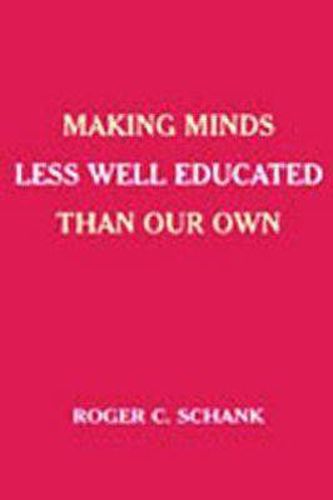Readings Newsletter
Become a Readings Member to make your shopping experience even easier.
Sign in or sign up for free!
You’re not far away from qualifying for FREE standard shipping within Australia
You’ve qualified for FREE standard shipping within Australia
The cart is loading…






In the author’s words: This book is an honest attempt to understand what it means to be educated in today’s world. Schank’s argument is this: No matter how important science and technology seem to industry or government or indeed to the daily life of people, as a society we believe that those educated in literature and history and other humanities are in some way better informed, more knowing, and somehow more worthy of the descriptor well educated. This nineteenth-century conception of the educated mind weighs heavily on our notions on how we educate our young. When the focus of education is on intellectual and scholarly issues as opposed to issues such as communications, or basic psychology, or child raising, we are continuing to rely on outdated notions of the educated mind that come from an elitist view of who is to be educated and what that means. To accommodate the realities of today’s world it is necessary to change this elitist view. We need to rethink what it means to be educated, to reconceptualize the very idea of education as a process that forefronts and values learning by doing. Students need to learn how to think and they need to learn by doing - not how to accomplish tasks such as passing standardized tests and reciting rote facts. In this engaging book, Roger Schank sets forth the premises of his argument, cites its foundations in the Great Books themselves, and illustrates it with examples from an experimental curriculum that has been used in graduate schools and with K-12 students. Making Minds Less Well Educated Than Our Own is essential reading for scholars and students in the learning sciences, instructional design, curriculum theory and planning, educational policy, school reform, philosophy of education, and higher education, and anyone interested in what it means to be educated in today’s world.
$9.00 standard shipping within Australia
FREE standard shipping within Australia for orders over $100.00
Express & International shipping calculated at checkout
In the author’s words: This book is an honest attempt to understand what it means to be educated in today’s world. Schank’s argument is this: No matter how important science and technology seem to industry or government or indeed to the daily life of people, as a society we believe that those educated in literature and history and other humanities are in some way better informed, more knowing, and somehow more worthy of the descriptor well educated. This nineteenth-century conception of the educated mind weighs heavily on our notions on how we educate our young. When the focus of education is on intellectual and scholarly issues as opposed to issues such as communications, or basic psychology, or child raising, we are continuing to rely on outdated notions of the educated mind that come from an elitist view of who is to be educated and what that means. To accommodate the realities of today’s world it is necessary to change this elitist view. We need to rethink what it means to be educated, to reconceptualize the very idea of education as a process that forefronts and values learning by doing. Students need to learn how to think and they need to learn by doing - not how to accomplish tasks such as passing standardized tests and reciting rote facts. In this engaging book, Roger Schank sets forth the premises of his argument, cites its foundations in the Great Books themselves, and illustrates it with examples from an experimental curriculum that has been used in graduate schools and with K-12 students. Making Minds Less Well Educated Than Our Own is essential reading for scholars and students in the learning sciences, instructional design, curriculum theory and planning, educational policy, school reform, philosophy of education, and higher education, and anyone interested in what it means to be educated in today’s world.